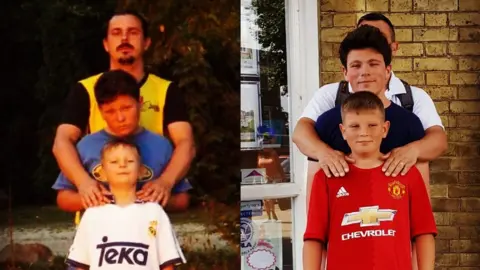EU workers in the UK: Do I stay or do I go?
 Waclaw Wiater
Waclaw WiaterThere has been a record drop in the number of Eastern European workers in the UK, latest figures show. Here, two families, one from Poland and one from Romania, explain their reasons for leaving and staying in the UK.
"This might sound crazy but even though I'm going to take a 50% pay cut back home in Poland that money will take me further."
After 12 years of living, working and raising a family in the UK, Waclaw Wiater and his wife have decided to move back to their home country.
"The British pound just doesn't take you as far any more," he says.
Waclaw, who works for an engineering company in Wellingborough, Northamptonshire, says it's not just the weaker exchange rate that's hit his pocket.
"The cost of shopping, just for weekly essentials, the prices of everything have just absolutely rocketed.
"We don't go to Tesco or Sainsbury's, we stay away from those places, we go to Aldi or Lidl and for us it's £120 or £150 per week."
Lower prices and an improving economy in Poland are also pulling him home.
"The cost of petrol and diesel is much lower in Poland," he says.
"Not only do we pay about £1 per litre, you've also got your road tax included in that price.
"Also council tax, here [in the UK], it goes up and up every year. In comparison to back where we are going to live, we don't pay council tax at all."
Record numbers
Waclaw says he was shocked at how easy it was to get a similar job in Poland to the one he has in the UK and surprised at the amount of money he was offered as a salary.
"I fired off some CVs and the first two companies that I applied to for a job with were straight on to me."
After phone interviews he was flown over for face-to-face meetings and offered a job two days later.
This is not surprising perhaps when an IMF report last year said Poland's "economy is operating above potential, with the unemployment rate at a historical low".
Waclaw is just one of a record number of workers from the EU 8 (the countries, including Poland, Latvia and Estonia, that joined the EU in 2004) leaving the UK.
Recent figures from the Office for National Statistics show there was a record drop of 117,000, or 12%, in the number of migrants from those countries working in the UK between April and June 2018.
'Land of opportunity'
There is a flipside to this story though.
While the number of workers from the EU 8 countries is down, the number of Romanians and Bulgarians working in the UK is at a record high.
ONS figures from the same period show there were 391,000 working here, up more than 50,000 from 2017.
Ioan Hoza came to the UK from Romania four years ago and works for a logistics company in Daventry.
"We got to the point in Romania where we couldn't afford to raise the children," he says.
"We didn't get paid regularly, we had issues with the bills, we couldn't deal with basic issues like feeding our children."
After making the decision to move to the UK, he started doing night shifts in the warehouse and has worked his way up to become an IT analyst on a major contract for his company.
 Ioan Hoza
Ioan Hoza"I said I would give myself 12 months to earn enough capital to be able to bring my family over to join me. If I didn't earn enough I would simply go back to Romania."
Those night shifts, along with hard work and securing several promotions meant Ioan had enough money to bring his wife and two children to the UK within six months.
"The beauty of how the system works here is you've got opportunities and it's up to you which path you are going to take."
Ioan's wife Dora works late shifts at the same logistics company while sons Liviu, 17, and 11-year-old Raul have both settled into school. After three-and-a-half years they both speak perfect English without any trace of an accent.
"So far we've managed to accomplish so many things in four years here in the UK that we could have only dreamed of in Romania," Ioan says.
It's not difficult to understand why. Despite strong growth of around 7%, Romania is one of the EU's poorest countries. The World Bank measured its GDP at $211bn (£162bn) last year with average monthly salaries of around $600 (£460).
 Ioan Hoza
Ioan HozaSitting in the house he has managed to buy in the suburbs of Daventry, Ioan says; "I'm still living the dream. I still have to pinch myself that I am actually living a dream.
"Maybe it sounds funny but sometimes I touch the walls of this house and say, 'You're mine.'
"That feeling, 'You are actually mine,' is unbelievable, how everything came together and how we are now where we are."
You can hear more on BBC Radio 4's Money Box programme on Saturday at 12:00 BST or listen again here